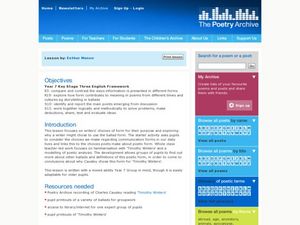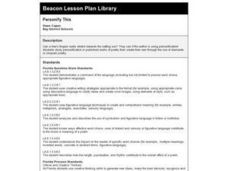Curated OER
Connotation: "My Papa's Waltz" by Theodore Roethke
What's happening in this poem? Have your high schoolers participate in an activity about connotation and denotation. They apply the concept of connotation to a reading of Theodore Roethke's poem "My Papa's Waltz." Lead a discussion about...
Curated OER
Hermeneutics: Teaching Students Author's Purpose
Your developing literary critics discuss 'perspective' and discuss how the same occurence can be interpreted by two different people in two different ways. They read Ryszard Kapuscinski's untitled poem, infer meaning of the poem, and...
Curated OER
Language Arts - Sixth Grade
Sixth graders review the definition of adjectives and synonyms. Then, they produce a poem using as many of those words as they can. This language arts PowerPoint also reviews the elements necessary to construct a poem.
Curated OER
Simply Speaking
Emerging orators distinguish between effective and ineffective public speaking strategies. They read a text that fits in with a Native Americans unit and speak about the text with both ineffective and effective volume, tone, phrasing,...
Curated OER
Figurative Language: Simile and Metaphor
What is figurative language? Introduce your young learners to the most popular forms of figurative language: the simile and the metaphor. Start by reading "Willow and Ginkgo" by Eve Merriam, and identify where similes are used. Then look...
Curated OER
Reading Comprehension: Fiction and Nonfiction
This resource is made up of a series of reading passages with accompanying questions. On the first page, learners read the definitions of both fiction and non-fiction. They examine four short selections before writing either fiction or...
App State
Brainstorming
Get your young writers outside of the traditional essay writing mode with Free Write Friday. Free Write Friday encourages your class to use personal experiences or knowledge to write more creative pieces. Young writers could experiment...
Curated OER
William Shakespeare's Julius Caesar: Fate versus Free Will
Tenth graders explore Shakespeare's Julius Caesar. After reading specific scenes, they brainstorm and discuss free will. Students observe a clip from the Dr. Phil television show entitled, "Afraid to Age" and make connections from the...
Curated OER
Let's Learn Library Language
This PowerPoint presentation provides a review of 'library language', vocabulary associated with books and the library such as cover, title, author, illustrator, call number and fiction/nonfiction. Each slide of this PowerPoint displays...
Curated OER
Paradise Lost: Anticipation Guide
To set the stage for reading Paradise Lost, class members compete an anticipation guide containing statements that connect to themes in Milton's epic poem.
Curated OER
Life Is a Journey
Students consider the literal and figurative definitions of the word journey. In this metaphor lesson, students discuss life journeys and their diversity.
Curated OER
Poetry IV--Similes and Metaphors
Students solve and write riddles using similes and metaphors. In this similes and metaphors lesson, students work in groups to solve descriptive riddles for famous landmarks. Students are given pictures of landforms and write...
Curated OER
Poetry: What's on Your Plate (Part 2)
Students write a short paragraph using strong descriptions. In this using modifiers lesson, students define modifier, adjective, adverb, metaphor, and simile. Students then write a journal entry in which they write about a...
Utah Education Network (UEN)
Self-Concept: Self-Esteem
Most teenagers struggle with self-image and self-esteem. Guide them through these stormy waters with a series of activities focused on positive messages, true friendship and support, and self-concept.
Curated OER
Anticipatory Sets for The Odyssey
Start your unit on The Odyssey in a fun and accessible way! Three options help your young readers grasp the concept of brave Odysseus's tale, including making masks of Greek gods and goddesses, and responding to different...
Appalachian State University
Making Your Point Using Dialect
Explore the sounds, importance, and effectiveness of dialect in literature. Active participants read, listen to poetry, and explore dialect by developing a formal definition, discuss the benefits of its use, complete a Venn diagram...
Facing History and Ourselves
Confirmation and Other Biases
As the investigation into the reporting of the events in Ferguson, Missouri, continues, class members consider how bias influences perception, how the tendency is to collect evidence that supports preconceived notions. The big idea...
Curated OER
From the Land, Of the Land: An Interdisciplinary Lesson on Indigenous People
Students research the concept of indigenous people then write a diamante poem about them. They research online and use an online poem tool to create their poem.
Curated OER
Limericks
Fourth graders look up the definition of "Limerick" in the dictionary. They listen to the teacher explain a limerick and read an example of a limerick. Students brainstorm rhyming words and write their own limericks.
Curated OER
Figurative Language
Young scholars interpret figurative language. In this language lesson, students are read the poem "I Love the Look of Words" by Maya Angelou and are to find examples of hyperbole and personification in the poem. Young...
Curated OER
Spring Activities
In this Spring worksheet, students read a poem about a furry caterpillar. Students color the picture and underline the rhyming words. Students also write the rhyming words and compose their own caterpillar poem.
Curated OER
Ballads and Communication
Students compare and contrast different forms of communication. For this poetry lesson, students focus on the ballad form and read "Timothy Winters". Students draw conclusions from the ballad and divide into groups to research the...
Curated OER
A Moment in Time
Eighth graders study poems to see how punctuation, line length, rhythm and word choice can be used to create a memorable moment. They read and discuss poems by Shel Silverstein.
Curated OER
Personify This
Eighth graders study personification in published works of poetry, then create their own through the use of diamante or cinquain poetry. They read and discuss poetry by Shel Silverstein, William Jay Smith, and Elinor Wylie.

























